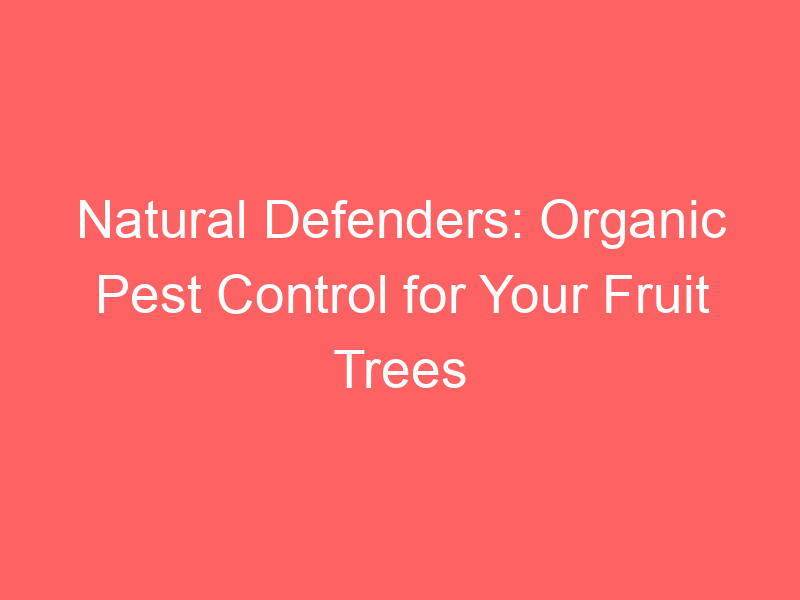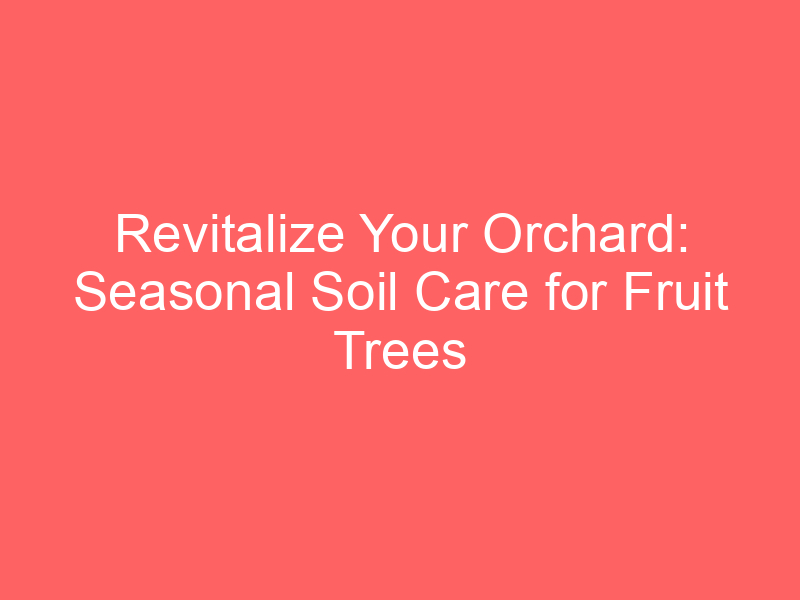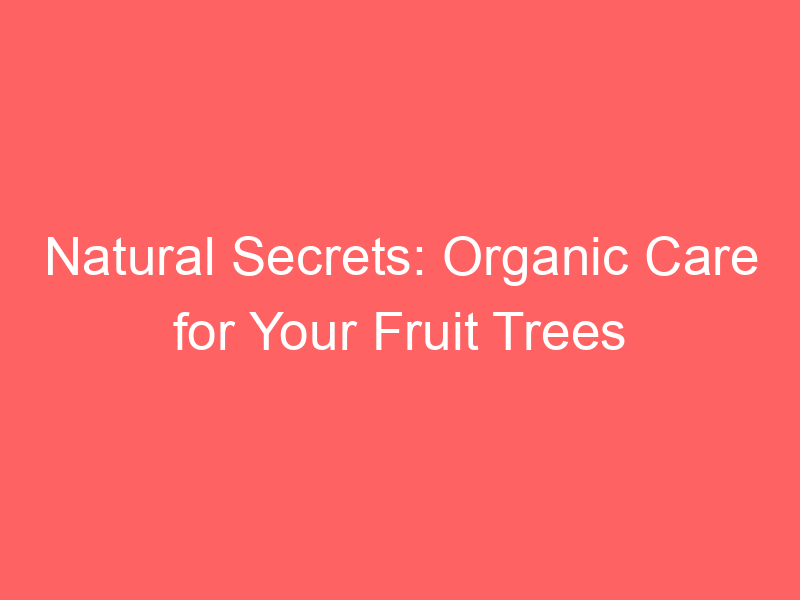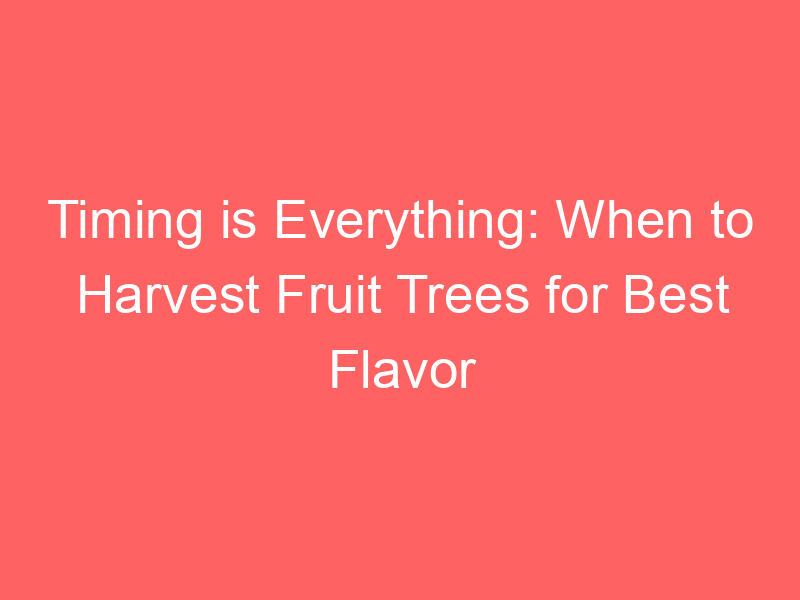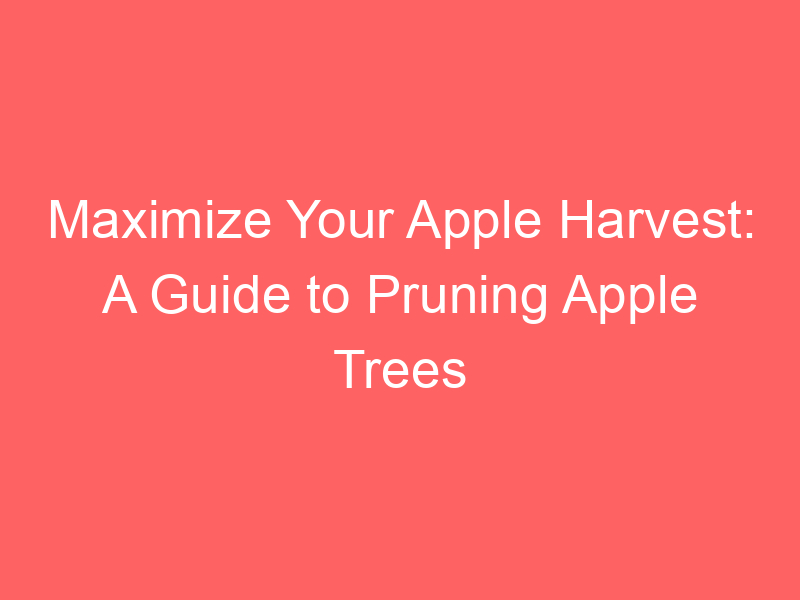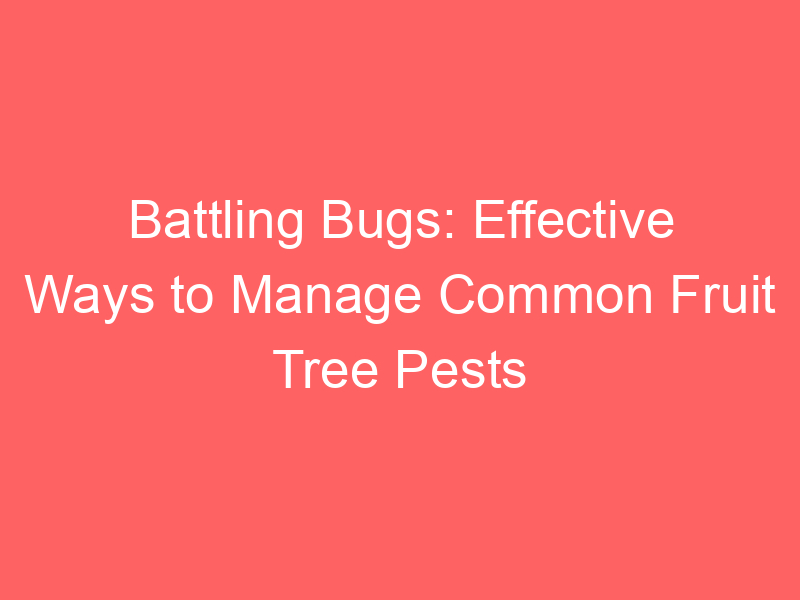Introduction to Organic Pest Control for Fruit Trees
For those who love growing fruit trees at home, dealing with pests can be a significant challenge. However, there’s a solution that’s not only effective but also safe for the environment – organic pest control. This method uses natural substances and beneficial insects to keep harmful pests at bay, ensuring your fruit trees flourish.
- Overview of Organic Pest Control
- Benefits of Organic Pest Control for Fruit Trees
Organic pest control is a method that involves using natural substances and beneficial insects to manage pests. Instead of using synthetic pesticides, which can harm the environment and potentially your health, organic pest control uses substances derived from plants and minerals, as well as beneficial insects like ladybugs and lacewings, to control pests. This method is not only effective but also sustainable, making it an excellent choice for home fruit tree growers. For more information, you can visit this Wikipedia page.
There are several benefits to using organic pest control for your fruit trees. First, it’s safer for you and your family. Synthetic pesticides can leave residues on fruits, which can be harmful if ingested. With organic pest control, you don’t have to worry about this. Second, it’s better for the environment. Synthetic pesticides can contaminate soil and water, harming wildlife and beneficial insects. Organic pest control methods, on the other hand, are eco-friendly. Lastly, organic pest control can lead to healthier, more robust fruit trees. Synthetic pesticides can weaken trees over time, but organic methods help to maintain the overall health of your trees, leading to better fruit production.
In the following sections, we will delve deeper into organic fruit tree care, specific organic pest control methods for different fruit trees, DIY organic pest control, and organic insecticides. Stay tuned to learn more about embracing organic pest control methods for your fruit trees.
Understanding Organic Fruit Tree Care
Organic fruit tree care is a holistic approach that emphasizes the health of the entire ecosystem. It involves practices that nourish the soil, support beneficial insects, and promote the overall health and productivity of the tree. One crucial aspect of organic fruit tree care is maintaining a regular spray schedule.
Organic Fruit Tree Spray Schedule
Implementing a regular spray schedule is essential for the health and productivity of your fruit trees. Let’s delve into the importance of a regular spray schedule and how to create an effective one.
- Importance of a Regular Spray Schedule
- Creating an Effective Organic Fruit Tree Spray Schedule
- Identify the Needs of Your Trees: Different fruit trees have different needs. For example, apple trees may require more frequent spraying than peach trees. Research the specific needs of your trees to determine the best spray schedule.
- Monitor for Pests and Diseases: Regularly check your trees for signs of pests or diseases. If you notice any, adjust your spray schedule accordingly.
- Choose the Right Organic Spray: Not all organic sprays are created equal. Some are more effective against certain pests or diseases. Choose a spray that is suited to the needs of your trees.
- Stick to the Schedule: Consistency is key when it comes to spraying. Make sure to stick to your schedule to ensure the best results.
Regular spraying is vital for several reasons. Firstly, it helps to prevent the onset of diseases and pest infestations, which can severely impact the health and yield of your fruit trees. Secondly, regular spraying ensures that your trees receive the necessary nutrients they need to thrive. According to a study, trees that are regularly sprayed with organic solutions have a 20% higher yield than those that are not.
Creating an effective spray schedule requires understanding the specific needs of your fruit trees and the potential threats in your region. Here are some steps to help you create an effective spray schedule:
Remember, an effective organic fruit tree spray schedule is a vital part of organic fruit tree care. It helps to keep your trees healthy and productive, ensuring a bountiful harvest for you to enjoy.
Organic Fruit Tree Spray Recipe
Creating your own organic fruit tree spray is a cost-effective and eco-friendly way to protect your home orchard. Let’s dive into the ingredients you’ll need and the steps to prepare it.
- Ingredients for a Homemade Organic Fruit Tree Spray
- 1 gallon of water
- 1 tablespoon of baking soda
- 1 tablespoon of vegetable oil
- 2 tablespoons of liquid soap (ensure it’s not a detergent)
- Optional: 1-2 tablespoons of vinegar (helps to fight fungus)
- Steps to Prepare the Spray
- Fill a large bucket with 1 gallon of water.
- Add the baking soda, vegetable oil, and liquid soap to the water.
- Stir the mixture until everything is well combined.
- If you’re using vinegar, add it last and stir again.
- Pour the mixture into a spray bottle or garden sprayer.
- Spray your fruit trees thoroughly, making sure to cover all leaves, branches, and trunks.
Here’s what you’ll need to make your own organic fruit tree spray:
This simple recipe uses ingredients that are likely already in your kitchen. The baking soda helps to neutralize the pH on the leaf surface, making it less hospitable to fungi. The soap and oil work together to smother and kill unwanted pests.
Follow these steps to prepare your homemade organic fruit tree spray:
Remember to shake the spray bottle before each use to ensure the ingredients are well mixed. Spray your fruit trees once a week, or after heavy rain, for the best results.
By using this homemade organic fruit tree spray, you’re not only protecting your fruit trees from pests and diseases, but also contributing to a healthier environment. Happy gardening!
Organic Pest Control for Specific Fruit Trees
One of the most rewarding aspects of growing your own fruit trees is the harvest. However, pests can sometimes pose a challenge. Let’s delve into organic pest control methods for specific fruit trees, focusing first on citrus trees.
Organic Pest Control for Citrus Trees
Citrus trees, like oranges, lemons, and grapefruits, are a popular choice for home gardens. However, they can attract a variety of pests. Let’s explore the common pests and organic control methods for these trees.
- Common pests in citrus trees
- Organic pest control methods for citrus trees
- Beneficial Insects: Ladybugs and lacewings are natural predators of aphids and can help control their population.
- Neem Oil: This natural pesticide can be sprayed on the leaves to deter pests like the citrus leafminer and citrus psyllid.
- Homemade Sprays: A spray made from water, dish soap, and cayenne pepper can deter many pests.
- Companion Planting: Planting marigolds or garlic near your citrus trees can help repel pests.
Citrus trees can be affected by a variety of pests. Some of the most common include the citrus leafminer, citrus psyllid, and aphids. The citrus leafminer is a small moth whose larvae tunnel through the leaves, causing a silvery trail. The citrus psyllid can cause a disease known as citrus greening, which can be deadly to the tree. Aphids are small insects that suck the sap from the tree, causing the leaves to curl and yellow.
Organic pest control methods are a safe and effective way to keep your citrus trees healthy. Here are some methods you can try:
Remember, the key to effective organic pest control is regular observation and early intervention. By keeping a close eye on your citrus trees and acting at the first sign of pests, you can keep your trees healthy and your harvest bountiful.
Natural Pest Control for Other Fruit Trees
While citrus trees have their unique challenges, other fruit trees like apple, peach, and cherry trees also face their share of pests. However, with the right organic pest control methods, you can ensure a healthy and bountiful harvest. Let’s explore some of these methods.
- Organic Pest Control for Apple Trees
- Organic Pest Control for Peach Trees
- Organic Pest Control for Cherry Trees
Apple trees are often targeted by pests like codling moths and apple maggots. An effective organic solution is the use of Trichogramma wasps. These tiny wasps lay their eggs inside the eggs of harmful pests, preventing them from hatching. Another method is to use sticky traps to catch apple maggots before they can harm your trees.
Peach trees can suffer from pests like peach tree borers and oriental fruit moths. One organic method to combat these pests is to use beneficial nematodes. These microscopic worms attack and kill pest larvae in the soil. You can also use pheromone traps to catch male moths, preventing them from mating and reducing the population.
Cherry trees are often plagued by pests like cherry fruit flies and tent caterpillars. To control these pests organically, you can introduce beneficial insects like ladybugs and lacewings that feed on these pests. Another method is to use a homemade spray made from garlic and hot peppers, which can deter many pests.
Remember, the key to successful organic pest control is early detection and prevention. Regularly inspect your trees for signs of pests and take action as soon as you spot any. With these organic methods, you can enjoy a pest-free harvest while also protecting the environment.
DIY Organic Pest Control for Fruit Trees
Organic pest control is a safe and sustainable way to keep your fruit trees healthy and productive. Let’s explore the benefits of DIY organic pest control and some homemade recipes you can try.
- Benefits of DIY Organic Pest Control
DIY organic pest control offers numerous advantages for both your fruit trees and the environment. Here are some key benefits:
- Eco-Friendly: Organic pest control methods do not use harmful chemicals, making them safe for the environment and beneficial insects.
- Cost-Effective: Many organic pest control solutions can be made from common household items, saving you money on expensive commercial products.
- Healthier Fruit: Organic methods ensure your fruit is free from chemical residues, providing healthier and tastier harvests.
- Improved Soil Health: Organic pest control methods enhance soil fertility and biodiversity, promoting healthier and more productive trees.
- Homemade Organic Pest Control Recipes
Ready to try your hand at DIY organic pest control? Here are some simple and effective recipes to get you started:
- Garlic Insecticide Spray: Blend two whole bulbs of garlic with a small amount of water. Strain the mixture and add enough water to make a gallon of spray. This potent mixture deters many pests.
- Chili Pepper Spray: Blend one cup of hot peppers with two cups of water. Strain and spray on your trees to deter pests. Be sure to wear gloves and avoid contact with your eyes when handling hot peppers.
- Vinegar Fruit Fly Trap: Fill a jar halfway with apple cider vinegar and add a few drops of dish soap. Cover the jar with a lid that has small holes punched in it. Fruit flies are attracted to the vinegar and will be trapped inside the jar.
Remember, consistency is key with organic pest control. Regular application and monitoring will help keep your fruit trees pest-free and thriving.
Organic Insecticide for Fruit Trees
Organic insecticides are a safe and effective way to protect your fruit trees from harmful pests. They are made from natural ingredients and are free from synthetic chemicals that can harm your trees or the environment. Let’s delve into understanding these organic insecticides and how to apply them on your fruit trees.
- Understanding organic insecticides
Organic insecticides are derived from natural sources such as plants, bacteria, and minerals. They are designed to target and eliminate specific pests while leaving beneficial insects unharmed. Some common organic insecticides include neem oil, pyrethrin, and spinosad.
Organic insecticides are a healthier choice for your fruit trees and the environment. They break down more quickly in the environment, reducing the risk of long-term pesticide residue. They are also less likely to harm non-target species like bees and butterflies. According to Wikipedia, organic farming, which includes the use of organic insecticides, can lead to more biodiversity and better soil quality.
- How to apply organic insecticides on fruit trees
Applying organic insecticides to your fruit trees is a straightforward process. Here are some steps to guide you:
- Identify the Pest: Before applying any insecticide, it’s important to identify the type of pest you’re dealing with. This will help you choose the most effective organic insecticide.
- Choose the Right Insecticide: Once you’ve identified the pest, choose an organic insecticide that is known to be effective against that specific pest.
- Apply the Insecticide: Follow the instructions on the insecticide label for application. This usually involves diluting the insecticide with water and spraying it on the affected areas of the tree.
- Monitor the Tree: After application, keep an eye on your tree to see if the pests are decreasing. You may need to reapply the insecticide after a few days or weeks, depending on the severity of the infestation.
Remember, the goal of using organic insecticides is not to eliminate all insects, but to maintain a healthy balance in your garden. Some insects are beneficial and can help control pest populations. So, use organic insecticides judiciously and only when necessary.
Conclusion: Embracing Organic Pest Control Methods for Fruit Trees
As we draw to a close on our exploration of organic pest control methods for fruit trees, it’s clear that these natural solutions offer a wealth of benefits. Not only do they help maintain the health and vitality of your fruit trees, but they also contribute to a safer and more sustainable environment.
- Recap of organic pest control benefits
- Encouragement to try organic pest control methods
Organic pest control methods offer a myriad of advantages. They are safe for both your family and the environment, reducing the risk of harmful chemical exposure. They help maintain the balance of the ecosystem by only targeting harmful pests and not beneficial insects. Furthermore, they can be cost-effective, as many solutions can be homemade using common household items.
With all these benefits in mind, we strongly encourage you to embrace organic pest control methods in your fruit tree care routine. It’s a step towards a healthier, more sustainable world. Remember, every small action counts. By choosing organic, you’re not only ensuring a bountiful harvest but also playing a part in preserving our planet.
As a final note, remember that patience and consistency are key when it comes to organic pest control. It may take a little more time and effort, but the rewards are well worth it. So, why not give it a try? Your fruit trees, and the environment, will thank you.

